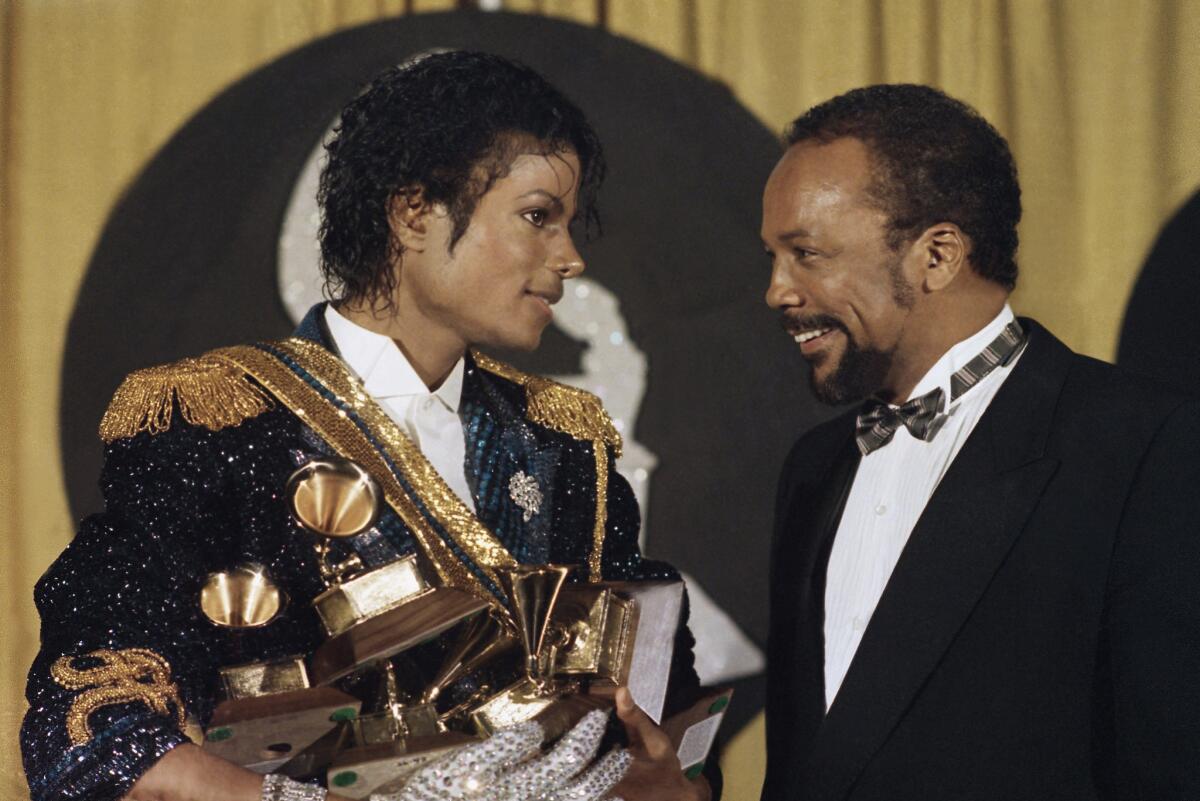Oscars 2016: The nominations are as white as MTV was in 1983 -- and it might cost the academy

Michael Jackson is shown in 1984 holding his many awards as he speaks with Quincy Jones at the Grammy Awards. The year before, David Bowie put MTV on the spot for featuring so few black artists.
It’s 2016, and once again, it's #OscarsSoWhite – and male. What is the Academy of Motion Picture Arts and Sciences doing to be more inclusive?
“We’re trying to move in that direction.”
That could be a statement from the academy's PR team. But that phrase didn't come from the academy. Those are the words uttered by former MTV host Mark Goodman, during a 1983 interview with the late David Bowie.
Bowie had interrupted an otherwise pleasant interview to ask why, in a year when Michael Jackson was at the top of the charts with "Beat It” and “Billie Jean,” MTV’s programming was almost entirely white.
“I’m just floored by the fact that there are so few black artists featured on [MTV],” Bowie said. “Why is that?”
“We’re trying to move in that direction,” said Goodman. But then he explained that MTV also had to be mindful of the sensibilities of white people in “some town in the Midwest…that would be scared to death by Prince.”
“That’s very interesting,” said Bowie, who ended that year below both Michael Jackson and Prince in total Hot 100 Billboard singles ranking, and spent far less time at No. 1 than Lionel Richie.
Bowie smiled, and repeated: “Isn’t that interesting?”
In retrospect, Goodman’s illogical hemming and hawing from 1983 sounds a lot like the aversion to diverse talent we see in the film industry in 2016.
For the second year in a row, all of the actors nominated for Oscars are white. This is strange, considering that the audience is so much more diverse – and enthusiastic – than that. People of color represent only 37% of the U.S. population, but bought 46% of all movie tickets in 2014.
Mexican-born director Alejandro G. Iñárritu is holding it down for Latinos with a director nomination, but he is a solitary, off-camera figure in an industry in which only 4.2% of speaking roles in the top 100 films of 2012 were held by a Latino. Latinos, meanwhile, are the most avid moviegoers in the country.
But perhaps the starkest gap between talent and nominations is among black actors and producers. Just like MTV had trouble playing the hottest artists of the time, the academy can’t even recognize black people for making movies about black people.
“Straight Outta Compton” got nominee nods – but not for F. Gary Gray, the black director. The mostly black cast, including Jason Mitchell, who delivered a brilliant performance as the late rapper Eazy-E, were also snubbed. Instead, the white writers were nominated.
Sylvester Stallone received a deserving nomination for his reprisal of Rocky Balboa in “Creed” – but neither the film’s black star, Michael B. Jordan, nor black writer-director Ryan Coogler, were recognized.
More from Bowie’s 1983 interview:
Do you not think that [not being able to play popular black music on MTV] is a frightening predicament to be in?
David Bowie continued to press on with his line of questioning about MTV’s failure to feature black artists. His interviewer got defensive, saying that the station was simply following industry conventions. Without directly talking about money – which would be a no-no for MTV’s anti-establishment image – he implied that offending white stakeholders could hurt their bottom line.
The film industry often tries the same excuse.
When director Ridley Scott was criticized for casting white people in the key roles for “Exodus: Gods and Kings,” he said it was a financial decision, based on other people’s biases.
“I can’t mount a film of this budget, where I have to rely on tax rebates in Spain, and say that my lead actor is Mohammad so-and-so from such-and-such,” he said.
The television industry is starting to learn that given the chance, women and people of color will excel – and bring in revenue. “How to Get Away With Murder” star Viola Davis put this to words when she accepted her Emmy, saying that “the only thing that separates women of color from anyone else is opportunity.”
But whereas there are sparks of hope in the film industry, the academy has trouble giving women, and people of color, those opportunities to be recognized. According to a 2012 study by The Times, the Oscar voting body was 94% white, and 77% male. If it doesn’t get its act together quickly, the academy is going to be in a worse place than MTV was.
In the late '90s, a black college student named David K Far-El started an internship at MTV. In a video lecture published last year, he said that every afternoon, white people at the station would gather around the television and tune in to BET to watch programs like “Rap City” and “Video Soul.” Far-El was confused, and asked what in the world they were doing watching a rival station with lower production values and budget.
They told him: “this is how we tell what black America is doing.”
More than a decade on from the Bowie interview, MTV’s own legacy was still hurting it. In order to stay relevant to America’s teens, MTV had to scramble to get content and ideas from a black station.
Unless the film industry, especially the academy, can address the structural issues that are preventing it from keeping pace with the television and music industries’ progress on inclusion, they’re going to be hurting for years to come. On Twitter, many people of color are saying that if the academy is uninterested in their experiences, then they are uninterested in the academy’s ceremony. It’s possible that a lot of moviegoers will boycott the televised ceremony again – like so many did last year. People may even create their own alternative “award shows,” with hashtags like #BlackTwitterMovieAwards.
It says a lot that it took David Bowie, a white guy from England who had briefly flirted with fascism, to put an American network in the hot seat for its fear of black musicians. But it says even more that after the music and television industries have begun to learn from their mistakes, that the academy is still not able to recognize brilliant artists of color when they see one.
In 2015, writer and former attorney April Reign created the #OscarsSoWhite hashtag – a mixture of humor and serious criticism of the constant failures, and excuses, of the film industry.
At the end of his interview, David Bowie left us with a little preview of that sentiment.
After delivering a series of excuses, interviewer Mark Goodman tries to wrap things up. “We can only teach a little bit at a time…does that make sense?” he asks. “Valid point?”
David Bowie pauses, and grins.
“I understand your point of view,” he says, and laughs.
At a certain point, that’s pretty much all you can do – laugh.
Follow me @dexdigi for more on the intersection of culture and the Internet
From the Oscars to the Emmys.
Get the Envelope newsletter for exclusive awards season coverage, behind-the-scenes stories from the Envelope podcast and columnist Glenn Whipp’s must-read analysis.
You may occasionally receive promotional content from the Los Angeles Times.




